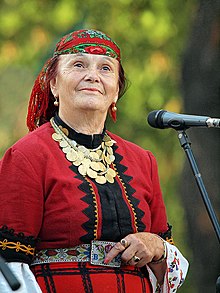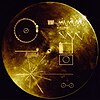| Valya Balkanska | |
|---|---|
 | |
| Background information | |
| Birth name | Feyme Kestebekova |
| Born | (1942-01-08) 8 January 1942 (age 82) Arda, Kingdom of Bulgaria |
| Genres | Folk |
| Occupation | Solo singer |
| Years active | 1960–present |
Valya Mladenova Balkanska (Bulgarian: Валя Младенова Балканска; born 8 January 1942) is a Bulgarian folk music singer from the Rhodope Mountains known locally for her wide repertoire of Balkan folk songs, but in the West mainly for singing the song "Izlel ye Delyo Haydutin", part of the Voyager Golden Record selection of music included in the two Voyager spacecraft launched in 1977.
Early life
Born as Feyme Kestebekova (Bulgarian: Фейме Кестебекова) in a Pomak family in a hamlet near the village of Arda, Smolyan Province, Balkanska has been singing Rhodope folk songs since her early childhood.
Career
Balkanska performs a repertoire of over 300 songs in Bulgaria and abroad. Balkanska has been working with the Rodopa State Ensemble for Folk Songs and Dances from Smolyan, of which she is a soloist, since 1960. Her album Glas ot vechnostta (Voice from the Eternity), released in 2004, is a compilation of her best-known songs, including "A bre yunache ludo i mlado", "Goro le goro zelena", and "Maychinko stara maychinko".
"Izlel ye Delyo Haydutin" and Voyager
Balkanska is most famous in the West for "Izlel ye Delyo Haydutin", which she recorded in 1968 accompanied by the bagpipe (gaida) players Lazar Kanevski and Stephan Zahmanov. Her best-known recording was made in the late 1960s by the American explorer of Bulgarian folklore Martin Koening and was released on vinyl in the United States. A few years later, a specimen of the record accidentally fell among the purchased records for the preparation of the Golden Record, a message from the Earth to fly out of the Solar System aboard two identical spacecraft from the NASA Voyager program. The song was included in the final 90-minute musical selection by Carl Sagan and flew first on the Voyager 2, which was launched on August 20, 1977, and two weeks later on September 5, 1977, on the Voyager 1. On August 25, 2012, Voyager 1 became the first object of human origin to leave the Heliosphere and to enter Interstellar medium.
Accolades
In 2002, Balkanska was awarded the Stara Planina Orden (the highest Bulgarian award). She was honoured with her own star plate on the Bulgarian Walk of Fame in Sofia in December 2005.
References
- "Voyager - Music on the Golden Record". voyager.jpl.nasa.gov. Retrieved 4 May 2021.
- "Late Junction: The songs they sent to space". www.bbc.co.uk. BBC Radio 3. Retrieved 4 May 2021.
- Sagan, Carl (2 April 2013). Murmurs of Earth. Random House Publishing Group. ISBN 978-0-307-80202-6.
- "Информационна Агенция 'Фокус'", Focus-News.net. (in Bulgarian)
- "ВАЛЯ БАЛКАНСКА", FamousGrouse.bg. (in Bulgarian)
External links
- "Valia Balkanska - Izlel e Delio Haidutin", YouTube.com.
- "Biography of Valya Balkanska", Avtora.com. (in Bulgarian)
- Village Music of Bulgaria, CD published in the Nonesuch Explorer series; Elektra Nonesuch 9 79195-2.
